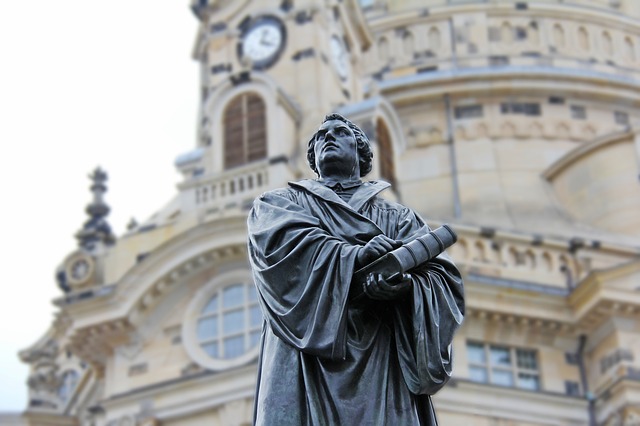
October 2017 marks the 500th anniversary of the Protestant Reformation. While Martin Luther (1483 – 1546) is credited with providing the impetus for the Reformation, his original intention was to understand his personal relationship with God in the light of what he read in the Bible rather than current practice within the church.
Personal struggles
In his vocation as a priest, Luther constantly agonized about his relationship with God. He wanted to have a pure love for God, which included confessing his every sin. But what if he missed one? Would God still love him?
Working through the Psalms, Luther realized that humility was not a virtue to strive for but rather the sheer absence of pride and self confidence.
Christ’s suffering revealed how God worked in the world. Luther decided that “God only saves sinners, only teaches the stupid, only enriches the poor, only raises the dead”. To be saved, one must be sinful, foolish, poor and helpless.
God’s righteousness is not a standard by which we are judged but a gift God gives to us – God justifies us by faith, ie makes us righteous. “We are not made righteous by doing righteous works, but rather we do righteous works because we are made righteous” The energy put into religious activity – confession, fasting etc – leaves very little time for real works of kindness or love to one’s neighbor.
Faith is not some sort of psychic quality but is “taking God at his word”, trusting that he loves and forgives the sinner.
The church at the time
Luther encountered a church hierarchy more interested in wealth and control than actually following what the Bible said. It had placed itself above censure and had lost all likeness to the suffering crucified Christ.
The pope was infallible and not to be challenged. Papal indulgences were sold and could even cover dead relatives in purgatory. Christians could trust their salvation to the power of indulgences rather than to repentance.
Delving into the Scriptures, Luther could find no evidence for this. Luther’s 95 theses were presented for academic debate, but the authorities saw them more as a threat to their power and wealth. He was accused of opposing the pope’s authority whereas he really challenged the theological basis on which the pope acted. He challenged the authorities of the day to show him from Scripture where he was wrong, but they weren’t interested.
Luther’s reforms
Luther’s basic issue was the authority and supremacy of the pope. The papacy and the church were supposed to nurture the people encouraging them in the faith according to Scripture. This was not happening. He espoused the idea of the priesthood of all believers and taught justification by faith, not by works.
He translated the Greek New Testament into German – previously the Latin Vulgate had been translated. Eventually he translated the whole Bible from the Greek and Aramaic, rather than the Latin, into a vernacular German. Every Christian had the duty to read and interpret Scripture.
The printing press ensured that his translations, and also sermons and teaching notes, were available to lay people in a language that was readable by ordinary people.
Today
There are significant issues today including gender “equality” and euthanasia. These issues have now grown to a point where they threaten not just the global church, but the fabric of society.
And just like the pope in Luther’s time, who was supposed to nurture and protect his flock but instead exploited them, many Christian leaders seem to have lost the plot: they are not being true to the Bible but are instead led by a desire to be acceptable and liked, politically correct.
The Five Solas
The Five Solas are five Latin phrases (or slogans) that emerged during the Reformation to summarize the Reformers’ theological convictions about the essentials of Christianity. It seems to me that in our climate of compromise and lack of spiritual leadership in large parts of the church, we would do well to take these to heart and go back to our first love.
Sola Scriptura (“Scripture alone”): The Bible alone is our highest authority: 2 Timothy chapter 3, verses 16 and 17. Through the Holy Spirit, individuals can, by themselves, interpret the scriptures responsibly.
Sola Fide (“faith alone”): We are saved through faith alone in Jesus Christ. Galatians chapter 3, verse 11 “Forsaking All I Trust Him” is a useful acronym.
Sola Gratia (“grace alone”): We are saved by the grace of God alone. Ephesians chapter 2, verses 8-10 “God’s Riches At Christ’s Expense” is another useful acronym. Ephesians chapter 1, verse 7
Solus Christus (“Christ alone”): Jesus Christ alone is our Lord, Saviour and King. Acts chapter 4, verse 12, and 1 Timothy chapter 2, verse 5.
Soli Deo Gloria (“to the glory of God alone”): We live for the glory of God alone. 1 Corinthians chapter 10, verse 31 As The Westminster Catechism says, the chief purpose of humankind is “to glorify God and enjoy him forever.” 1 Peter chapter 4, verse 11.
Contrary to Luther’s day where the church held onto control with an iron fist, the issue now is not one of control but compromise. So do we need another reformation, to replace the compromises and twisted theology prevalent at the moment?
Reference: Tomlin, G 2002 Luther and His World Lion Publishing

Aira Chilcott is a retired secondary school teacher with lots of science and theology under her belt. Aira is a panellist for Young Writers and indulges in reading, bushwalking, volunteering at a nature reserve and learning to play clarinet. Aira is married to Bill and they have three adult sons.
Aira Chilcott's previous articles may be viewed at http://www.pressserviceinternational.org/aira-chilcott.html

Aira Chilcott is a retired secondary school teacher with lots of science andtheology under her belt. Aira is an editor for PSI and indulges inreading, bushwalking and volunteering at a nature reserve. Aira’s husband Bill passed away in 2022 and she is left with three wonderful adult sons and one grandson.
Aira Chilcott's previous articles may be viewed at http://www.pressserviceinternational.org/aira-chilcott.html